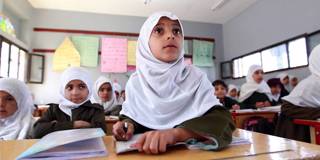As world leaders decide how to allocate resources in response to COVID-19, climate change, and conflict, they must make spending on education a much higher priority. This means rethinking international development policy with a view to achieving a world in which respect for equality and human rights starts with education for all.
GENEVA – The United Nations recently estimated that the number of crisis-affected children in need of urgent educational support has skyrocketed from 75 million in 2016 to 222 million today. That’s 222 million dreams dashed – and 222 million attacks on our collective humanity.
This growing crisis will have far-reaching effects on our economies and societies. But only 2-4% of global humanitarian funding is dedicated to education. As world leaders decide how to allocate resources in response to COVID-19, climate change, and conflict, they must make spending on education a much higher priority. This means rethinking international development policy with a view to achieving a world in which respect for equality and human rights starts with education for all.
Education requires money, but it is an investment that empowers people, creates more resilient economies, and ends poverty traps that perpetuate negative cycles of hunger, displacement, conflict, and chaos. A space flight with Jeff Bezos was recently auctioned for $28 million – a sum that could provide close to 200,000 crisis-affected children with the safety, power, and opportunity for an education.

GENEVA – The United Nations recently estimated that the number of crisis-affected children in need of urgent educational support has skyrocketed from 75 million in 2016 to 222 million today. That’s 222 million dreams dashed – and 222 million attacks on our collective humanity.
This growing crisis will have far-reaching effects on our economies and societies. But only 2-4% of global humanitarian funding is dedicated to education. As world leaders decide how to allocate resources in response to COVID-19, climate change, and conflict, they must make spending on education a much higher priority. This means rethinking international development policy with a view to achieving a world in which respect for equality and human rights starts with education for all.
Education requires money, but it is an investment that empowers people, creates more resilient economies, and ends poverty traps that perpetuate negative cycles of hunger, displacement, conflict, and chaos. A space flight with Jeff Bezos was recently auctioned for $28 million – a sum that could provide close to 200,000 crisis-affected children with the safety, power, and opportunity for an education.